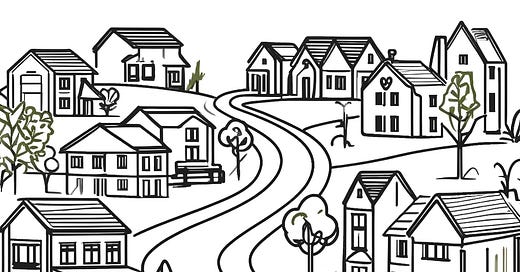It's an interesting time to write about cities. After real estate triggered the Great Financial Crisis, our economy finally recovered, only to enter a new crisis of affordability. Supply of housing is millions of units below demand. Cost of ownership has skyrocketed and markets are locked up. Economists say this the worst time in US history to buy a home. How did we get here?
Looking back we could describe the last 70 years or so as the Suburban Era. During the Suburban Era, America had an answer for housing, and the answer was simple. We built roads out from our central cities, and along every road we spread a standard formula of tract housing, shopping centers, and office parks. Sometimes we sprinkled garden apartment complexes or institutional campuses in between.
Not everyone loved this model, but most people liked it, because it worked. For the better part of two generations, this model made home ownership accessible to most people, even if some had to drive until they qualified. And buying a home was a good idea: with subsidized mortgages, favorable tax treatment, and steadily dropping interest rates, owning a home was nearly guaranteed to be a good investment. Unsurprisingly, homes are considered the "primary asset" for most American households today.
But the model isn't working anymore, and its failure is straining American society.
The Suburban Era was a product of our economic circumstances, collective values, enabling technologies, and supportive policies. As our circumstances, values, and technologies change, policy changes are following, and the Suburban Era is coming to a close.
This stack will focus on what comes next: the Post-Suburban future of our cities and neighborhoods.
Just as the automobile changed what was possible and reshaped the physical world in the 20th century, I see three new technologies that are capable of doing the same in the 21st century: Micromobility, Autonomy, and Remote Work. Combined, these technologies create opportunities for entirely new ways of living. We're in the early stages of experimentation now, eventually a new pattern of development will emerge and largely supplant today's suburban norm.
To start, I'll be writing for myself: we're approaching a turning point in history that's interesting to me and worth chronicling. I think the stack will be interesting for people interested in movements like Strong Towns, YIMBY, and Vision Zero on the "cities" side, as well as technology enthusiasts. If that sounds like your thing, then I invite you to subscribe and follow along!




